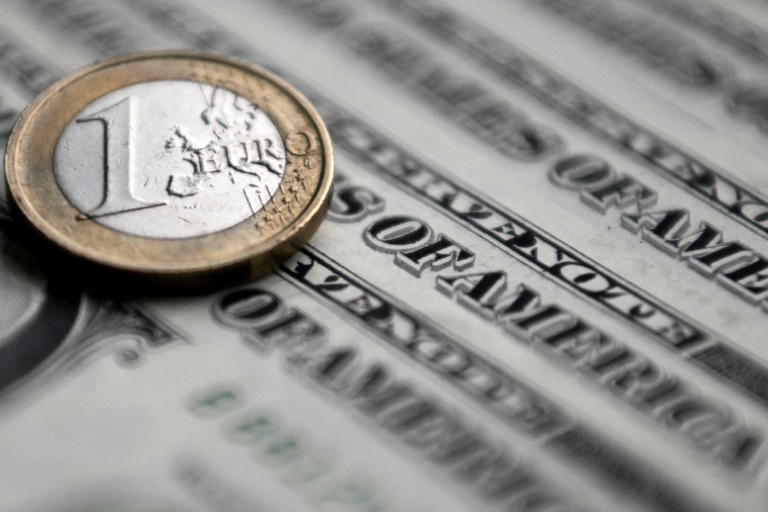
Eurozone stocks fell on Tuesday, weighed down by a strong euro as investors digested positive economic news, while Wall Street stocks fell on disappointing data.
Frankfurt and Paris stocks fell, but the euro rose against the dollar after data showed the euro zone economy emerged from recession as inflation came under control in the first quarter. The euro then gave up its rise and began to fall.
Meanwhile, the London market soared to a new high of 8,199.95 points, and HSBC soared more than 4% on a raft of share buybacks, despite a drop in first-quarter profits and the resignation of its chief executive.
However, the FTSE 100 index was unable to maintain its gains and closed lower.
Gross domestic product (GDP) in the euro zone, which fell into a shallow recession in the second half of last year, rose 0.3% from the previous quarter in the first three months of 2024, beating expectations, according to official data. The annual inflation rate in April remained at 2.4% compared to the previous month.
Economists say the figures are unlikely to stop the European Central Bank from cutting interest rates in June.
Meanwhile, the US Federal Reserve is expected to keep interest rates on hold after its two-day meeting on Wednesday, but its statement and comments from Chairman Powell will be analyzed for clues about the outlook. .
– Weight of the euro –
“The ECB is still expected to cut rates in June, but what happens after that remains uncertain,” Fiona Cincotta, an analyst at City Index, told AFP.
He said strong growth and persistent inflation could lead the ECB to keep interest rates high for an extended period of time, pushing the euro higher.
“However, higher borrowing costs over time are not good for companies and limit growth, which is why euro area stock exchanges are trending lower,” Cincotta added.
Wall Street stocks fell on Tuesday after U.S. consumer confidence fell to its lowest level since July 2022, according to the Conference Board.
Consumers in the United States, the powerhouse of the world's largest economy, appear to be less optimistic about the job market and more concerned about their future financial situation.
The Dow Jones Industrial Average fell 1.5%, and the S&P 500 index fell 1.6%.
The moves come ahead of the Fed's rate decision, and traders have been lowering their expectations for how many rate cuts the Fed will make since early 2024.
Inflation remains above target, various indicators point to economic and labor market resilience, and the Fed is likely to keep interest rates high for an extended period of time.
Asian markets generally rose. On Monday, a public holiday in Japan, the Tokyo stock market caught up with gains in Asian markets, rising more than 1%.
The yen fell slightly, but maintained most of its gains from the previous day, which observers attributed to authorities' intervention after hitting a 34-year low of 160.17 yen to the dollar.
Traders are wary of further volatility in the yen after the Bank of Japan decided last week to hold off on further reversing its ultra-easy monetary policy, offering little guidance on when it would do so.
~Main figures around 2030GMT~
New York – Dow: down 1.5%, 37,815.92 points (close price)
New York – S&P 500: down 1.6% to 5,035.69 (close)
New York-Nasdaq Composite: down 2.0% to 15,657.82 (close)
London – FTSE 100: down less than 0.1% to 8,144.13 (close)
Paris – CAC 40: down 1.0% to 7,984.93 (close price)
Frankfurt – DAX: 1.0% down to 17,932.17 (close price)
Euro STOXX 50: down 1.2% to 4,921.22 (closing price)
Tokyo – Nikkei Stock Average: 38,405.66 (closing price), up 1.2%
Hong Kong Hang Seng Index: 17,763.03 (closing price), up 0.1%
Shanghai – Overall: down 0.3% to 3,104.82 (closing price)
EUR/USD: down to $1.0673 from $1.0721 on Monday
USD/JPY: Increased from 156.35 yen to 157.80 yen
GBP/USD: down from $1.2563 to $1.2493
EUR/GBP: up from 85.33p to 85.41p
Brent crude oil: down 0.6% to $87.86 per barrel
West Texas Intermediate: down 0.8% to $81.93 per barrel
crowbar-rl/bys/sst

